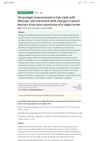1 citations,
January 2021 in “Indian Dermatology Online Journal” PRP can help treat hair loss but needs standardized methods for best results.
 January 2025 in “Journal of the Egyptian Womenʼs Dermatologic Society”
January 2025 in “Journal of the Egyptian Womenʼs Dermatologic Society” Higher substance P levels may cause discomfort in hair loss patients.

Hair RiseTM microemulsion effectively promotes hair growth and treats hair loss better than standard treatments.
 August 2024 in “Frontiers in Pharmacology”
August 2024 in “Frontiers in Pharmacology” Cyclosporine may cause hair loss, so patients need monitoring.
 July 2024 in “ACS Biomaterials Science & Engineering”
July 2024 in “ACS Biomaterials Science & Engineering” Nanoencapsulated antibiotics are more effective in treating hair follicle infections than free antibiotics.
 May 2024 in “Journal of functional foods”
May 2024 in “Journal of functional foods” Coffee bean residue extract helps hair growth by activating cell processes.
 May 2024 in “Brain disorders”
May 2024 in “Brain disorders” Agmatine may help reduce seizures linked to hormone changes in female rats.
March 2024 in “Journal of functional biomaterials” A kimchi-derived bacterium could help whiten teeth and prevent bad breath.
 January 2024 in “Authorea (Authorea)”
January 2024 in “Authorea (Authorea)” New punch technologies have improved hair transplant results over time.
 January 2024 in “Frontiers in Bioengineering and Biotechnology”
January 2024 in “Frontiers in Bioengineering and Biotechnology” A new method using stem cell membranes to deliver Minoxidil improved hair growth in mice better than Minoxidil alone.
 January 2024 in “Biotechnology advances”
January 2024 in “Biotechnology advances” Bioassays help find useful compounds in nature for making medicines, supplements, and cosmetics.
 November 2023 in “Materials Today Bio”
November 2023 in “Materials Today Bio” The new treatment using nanoparticles with ISX9 can effectively regrow hair without major side effects.
November 2023 in “Children” Many pediatric epilepsy patients experience preventable severe adverse drug reactions, especially with certain medications and risk factors.
 October 2023 in “Microorganisms”
October 2023 in “Microorganisms” Nirmatrelvir/Ritonavir treatment may lead to a weaker immune response to COVID-19, but doesn't affect the chance of rebound.
September 2023 in “Membranes” 3D-printed membranes with smart sensors can greatly improve tissue healing and have many medical applications.
 July 2023 in “JAAD International”
July 2023 in “JAAD International” Two drugs, finasteride and minoxidil, are approved for hair loss treatment, but new therapies are being developed.

Hair and nails can show hormone changes during puberty in dogs.
June 2020 in “Comparative medicine” NSG mice had the most mites, and genetic factors affect immune response and susceptibility.
 January 2017 in “Egyptian Journal of Dermatology and Venereology”
January 2017 in “Egyptian Journal of Dermatology and Venereology” Iron deficiency may contribute to chronic hair loss in premenopausal women.
November 2022 in “Journal of Nanobiotechnology” The developed system could effectively treat hair loss and promote hair growth.













